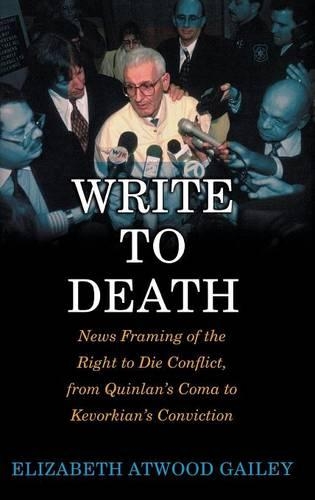
Write to Death: News Framing of the Right to Die Conflict, from Quinlan's Coma to Kevorkian's Conviction
(Hardback)
Publishing Details
Write to Death: News Framing of the Right to Die Conflict, from Quinlan's Coma to Kevorkian's Conviction
By (Author) Elizabeth A. Gailey
Bloomsbury Publishing PLC
Praeger Publishers Inc
30th September 2003
United States
Classifications
General
Non Fiction
179.7
Physical Properties
Hardback
200
Description
Has the mainstream media been careless in reporting on the issue of euthanasia As the Right to Die and Physician Assisted Suicide movements gather steam, the national media have been too quick to perpetuate and focus on the medical and legal overtones of death. The ethical, religious, and philosophical dimensions of our increased acceptance of euthanizing the aged, infirm, and disabled are often neglected. Gailey argues that the press's failure to enrich public discourse may well erode its trustworthiness in the public's eye. Using abundant examples from analysis of elite, mainstream news publications, Gailey details how the national press systematically advanced pro-euthanasia views and interpretations, while marginalizing or omitting pro-life perspectives and frames. The battle over legalizing passive and active euthanasia has enormous social, economic, and ethical implications. An understanding of how the news media frame or package such issues for public consumption is critical. Gailey's integrative approach combines an exploration of the major historical, ideational, and economic factors leading to the rise of the Right to Die movement, and includes in-depth analysis of the media's framing of the controversy in the two decades Karen Ann Quinlan's coma in 1975 to Dr. Jack Kevorkian's 1999 conviction.
Reviews
"This book examines the issue of euthanasia and the media's impact on the right to die movement. Using examples from news publications, Gailey argues that the national media have been too quick to focus on the medical and legal overtones of death while ignoring the ethical, religious and philosophical dimensions of euthanasia. She concludes that the press advanced pro-euthanasia views while marginalizing or omitting prolife perspectives."-Book Notes
"Using examples from mainstream publications, Gailey argues that the media has focused on the medical and legal aspects of euthanasia and ignored ethical and religious concerns, thereby promoting pro-euthanasia views and ignoring pro-life perspectives. This discussion of euthanasia from the perspective of media involvement makes this a unique resource."-Reference & User Services Quarterly
[G]ailey does a masterful job of introducing us to a wide array of issues and concerns about the way our media address important moral issues. She helps us to understand that the way the media packages issues can critically affect the social, economic and ethical dimensions of our lives and is therefore worthy our attention. Ans she raises a red flag that warns us to be more critical and pay attention to the role mass media plays in our society, particularly when life and death are on the line.-Law and Politics Book Review
This book examines the issue of euthanasia and the media's impact on the right to die movement. Using examples from news publications, Gailey argues that the national media have been too quick to focus on the medical and legal overtones of death while ignoring the ethical, religious and philosophical dimensions of euthanasia. She concludes that the press advanced pro-euthanasia views while marginalizing or omitting prolife perspectives.-Book Notes
Using examples from mainstream publications, Gailey argues that the media has focused on the medical and legal aspects of euthanasia and ignored ethical and religious concerns, thereby promoting pro-euthanasia views and ignoring pro-life perspectives. This discussion of euthanasia from the perspective of media involvement makes this a unique resource.-Reference & User Services Quarterly
This book examnes the issue of euthanasia and the media's impact on the right to die movement. Using examples from news publications, Gailey argues that the national media have been too quick to focus on the medical and legal overtones of death while ignoring the ethical, religious and philosophical dimensions of euthanasia. She concludes that the press advanced pro-euthanasia views while marginalizing or omitting prolife perspectives.-Book Notes
"Gailey does a masterful job of introducing us to a wide array of issues and concerns about the way our media address important moral issues. She helps us to understand that the way the media packages issues can critically affect the social, economic and ethical dimensions of our lives and is therefore worthy our attention. Ans she raises a red flag that warns us to be more critical and pay attention to the role mass media plays in our society, particularly when life and death are on the line."-Law and Politics Book Review
"This book examnes the issue of euthanasia and the media's impact on the right to die movement. Using examples from news publications, Gailey argues that the national media have been too quick to focus on the medical and legal overtones of death while ignoring the ethical, religious and philosophical dimensions of euthanasia. She concludes that the press advanced pro-euthanasia views while marginalizing or omitting prolife perspectives."-Book Notes
"[G]ailey does a masterful job of introducing us to a wide array of issues and concerns about the way our media address important moral issues. She helps us to understand that the way the media packages issues can critically affect the social, economic and ethical dimensions of our lives and is therefore worthy our attention. Ans she raises a red flag that warns us to be more critical and pay attention to the role mass media plays in our society, particularly when life and death are on the line."-Law and Politics Book Review
Author Bio
ELIZABETH ATWOOD GAILEY is Assistant Professor of Communication at the University of Tennessee, Chatanooga. Her research focuses on media cultural studies and the mass media's role in social change.
